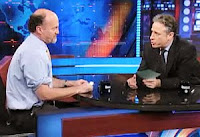 I can honestly say I have never seen Jon Stewart angry before. The hilarious host of Comedy Central’s “fake news” program The Daily Show occasionally gets frustrated or annoyed by certain current events or guests on his show, but until the other day I had never seen him truly outraged.
I can honestly say I have never seen Jon Stewart angry before. The hilarious host of Comedy Central’s “fake news” program The Daily Show occasionally gets frustrated or annoyed by certain current events or guests on his show, but until the other day I had never seen him truly outraged. Here’s what happened: On March 4, Stewart did a 5-minute Daily Show segment bashing CNBC and some of their news anchors. In the first few minutes, Stewart lampooned several of them for not seeing the obvious signs of the recession, particularly after Lehman Brothers crashed. He then showed clips of CEOs of financial firms on various CNBC shows, such as the CEO of Bear Sterns, talking about their company’s financial situation. These CEOs were obviously lying and several of their statements, but the CNBC anchors did not pursue the issue. Stewart concluded the segment by blaming CNBC for “dumbing down” finance news and making people believe their investments are somehow unaffected by what is going on in the stock market.
The show unintentionally sparked a small media frenzy. On CNBC, various anchors were lashing out at Stewart’s portrayal of their news station, calling him an “entertainer” and a “fake. ” CNBC’s Jim Cramer took it very personally, and he appeared on various CNBC shows (in addition to his own) to bash Stewart alongside his fellow anchors. Even Martha Stewart joined in—she jokingly told Cramer on her morning cooking show to hit a piece of dough with a rolling pin and pretend it was Jon Stewart’s head.
Then, on Thursday, the unthinkable happened: Jim Cramer appeared as a guest on The Daily Show. The interview came to dominate the entire episode, with Jon Stewart grilling Cramer about various financial topics. If you haven’t seen the interview, I recommend watching it here. For the first time, though, Stewart was legitimately angry. His typical routine of insulting his guest and then hiding behind the guise of being a comedian was gone—Jon was arguing and debating with Cramer, aggressively and seriously.

In addition to shaming Cramer by bringing up embarrassing details about his past, Jon Stewart made a one point I would like to discuss. First, he blamed CNBC as a whole for simplifying financial news and not reporting what was really going on. As evidence, he showed the introduction to Jim Cramer’s show, Mad Money, which depicts Cramer as a mock Christ-like figure, along with clips of Cramer on Mad Money using various props and yelling at the camera for emphasis. He went on to replay clips of CEOs lying on various CNBC shows. Lastly, he blamed CNBC for perpetuating the illusion that there are “two markets,” one that holds people’s long-term investments and the other that is the stock market. Instead, says Stewart, CEOs went on “Sherman’s marches through their companies financed by our 401(k)s,” and CNBC said nothing.
Here I agree with Jon Stewart—CNBC has not really analyzed the financial as much as their should, and they did not really get to the bottom of certain stories that the public deserved to hear. But I do disagree with Stewart’s claim that they should have predicted the financial crisis—though it was 10 years in the making, it took many people by surprise.
But what should CNBC really be doing? What is their responsibility as the sole reporter of financial news on cable television? According to Stewart, it should be to stop dumbing down their programming and do serious analysis rather than recommending certain stocks and interviewing CEOs. Though this is a noble goal, remember that CNBC does have to stay in business. If their programming is no longer entertaining as well as informative, their ratings will drop drastically. Rather than become a financial C-SPAN, CNBC needs to change its format to something like one of the “Big Three” networks: news-desk style programs rather than financial advice shows like Mad Money. Hopefully this format, which has kept the major networks alive can allow CNBC to better educate views while maintaining its ratings.

4 comments:
Hypocritical of Stewart to lash out at Cramer, "I understand that you want to make finance entertaining, but it's not a f**king game."
Meanwhile, what Stewart basically does is treat the whole world of politics like it's a f**cking game...
Well, yes. But I think it is less hypocritical than you make it sound because Stewart admits that his program is "fake news," while Cramer offers no such disclaimer on his own show--instead, he claims to be offering sound financial advice.
But I see your point: it is a bit odd for a comedian to accuse someone of making serious matters too entertaining.
Fair enough. I honestly don't know if CNBC was withholding information from the public. If so, that was wrong. But if they simply just did not see it coming, they don't deserve to be chastised for it. It's not like it was blatantly obvious.
I blame them more for dumbing finance down and not analyzing than for not predicting the recession.
Post a Comment